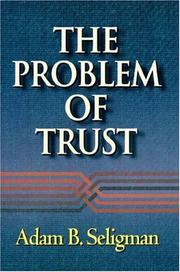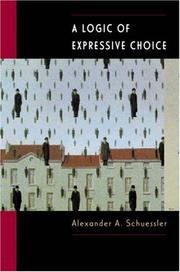| Listing 1 - 2 of 2 |
Sort by
|

ISBN: 0691050201 0691012423 1400822378 1400813360 9780691050201 9780691012421 1400807247 Year: 1997 Publisher: Princeton (N.J.): Princeton university press,
Abstract | Keywords | Export | Availability | Bookmark
 Loading...
Loading...Choose an application
- Reference Manager
- EndNote
- RefWorks (Direct export to RefWorks)
The problem of trust in social relationships was central to the emergence of the modern form of civil society and much discussed by social and political philosophers of the early modern period. Over the past few years, in response to the profound changes associated with postmodernity, trust has returned to the attention of political scientists, sociologists, economists, and public policy analysts. In this sequel to his widely admired book, The Idea of Civil Society, Adam Seligman analyzes trust as a fundamental issue of our present social relationships. Setting his discussion in historical and intellectual context, Seligman asks whether trust--which many contemporary critics, from Robert Putnam through Francis Fukuyama, identify as essential in creating a cohesive society--can continue to serve this vital role.Seligman traverses a wide range of examples, from the minutiae of everyday manners to central problems of political and economic life, showing throughout how civility and trust are being displaced in contemporary life by new "external' system constraints inimical to the development of trust. Disturbingly, Seligman shows that trust is losing its unifying power precisely because the individual, long assumed to be the ultimate repository of rights and values, is being reduced to a sum of group identities and an abstract matrix of rules. The irony for Seligman is that, in becoming postmodern, we seem to be moving backward to a premodern condition in which group sanctions rather than trust are the basis of group life.
Political sociology --- Political systems --- Social psychology --- #SBIB:35H501 --- 316.47.052 --- Bestuur en samenleving: netwerken, inspraak, participatie, interactief beleid --- Vertrouwen in sociale relaties --- 316.47.052 Vertrouwen in sociale relaties --- Social role --- Role, Social --- Social interaction. --- Trust. --- Social role. --- Social interaction --- Trust --- Human interaction --- Interaction, Social --- Symbolic interaction --- Trust (Psychology) --- Social status --- Exchange theory (Sociology) --- Psychology --- Attitude (Psychology) --- Emotions --- Agape. --- Appadurai, Arjun, "ed. --- Arendt, Hannah. --- Axial chasm. --- Banfield, Edward. --- Benhabib, Seyla. --- Bernstein, Basil. --- Boden, Deirdre. --- Bynum, Caroline. --- Calvinism. --- Cambridge Platonists. --- Catholicism. --- Christianity. --- Constant, Benjamin. --- Diderot, Denis, "ed. --- Douglas, Mary. --- Durkheim, Emile. --- Elias, Norbert. --- Frankfurt, Harry. --- Ghana, Frafas people of. --- Grief, Avner. --- Harrison, Bernard, "ed. --- Herman, Gabriel. --- Kahneman, Daniel. --- Lasch, Christopher. --- Macfarlane, Alan. --- Maza, Sarah. --- Merton, Robert. --- Otto, Rudolf. --- Protestantism. --- Puritanism. --- asceticism. --- associational life. --- baptism, private. --- capitalism. --- citizenship. --- civility. --- communitarianism. --- confidence. --- contract law. --- credit, symbolic. --- divorce. --- expectation, trust as. --- externality. --- familiarity. --- friendship. --- game theory. --- honor. --- incivisme. --- marriage. --- networks, of trust. --- postmodernity. --- Rol social. --- Interacción social. --- Interaction sociale --- Role (Sociology) --- Confiance --- Rôle social

ISBN: 069100661X 0691006628 9780691006628 9780691006611 069122241X Year: 2000 Publisher: Princeton: Princeton university press,
Abstract | Keywords | Export | Availability | Bookmark
 Loading...
Loading...Choose an application
- Reference Manager
- EndNote
- RefWorks (Direct export to RefWorks)
Alexander Schuessler has done what many deemed impossible: he has wedded rational choice theory and the concerns of social theory and anthropology to explain why people vote. The "paradox of participation"--why individuals cast ballots when they have virtually no effect on electoral outcomes--has long puzzled social scientists. And it has particularly troubled rational choice theorists, who like to describe political activity in terms of incentives. Schuessler's ingenious solution is a "logic of expressive choice." He argues in incentive-based (or "economic") terms that individuals vote not because of how they believe their vote matters in the final tally but rather to express their preferences, allegiances, and thus themselves. Through a comparative history of marketing and campaigning, Schuessler generates a "jukebox model" of participation and shows that expressive choice has become a target for those eliciting mass participation and public support. Political advisers, for example, have learned to target voters' desire to express--to themselves and to others--who they are. Candidates, using tactics such as claiming popularity, invoking lifestyle, using ambiguous campaign themes, and shielding supporters from one another can get out their vote even when it is clear that an election is already lost or won. This important work, the first of its kind, will appeal to anyone seeking to decipher voter choice and turnout, social movements, political identification, collective action, and consumer behavior, including scholars, graduate students, and upper-level undergraduates in political science, economics, sociology, anthropology, and marketing. It will contribute greatly to our understanding and prediction of democratic participation patterns and their consequences.
Rational choice theory --- Voting --- Political participation --- Rational choice theory. --- Social choice --- Ansolabehere, Stephen. --- Appadurai, Arjun. --- Bartels, Larry. --- Bonaccorso, John. --- Brennan, Geoffrey. --- Carter, Jimmy. --- Clinton, Bill. --- Diamond, Edwin. --- Durkheim, Emile. --- Edelman, Murray. --- Eisenhower, Dwight D. --- Ferejohn, John. --- Giddens, Anthony. --- Goodman, Robert. --- Haug, Wolfgang. --- Herbst, Susan. --- Hotelling, Harold. --- Iyengar, Shanto. --- Jamieson, Kathleen Hall. --- Johnson, Lyndon. --- King, Gary. --- Lennon, John. --- Lennons Problem. --- Lifestyle. --- Mickelson, Sig. --- Nagler, Jonathan. --- Nixon, Richard. --- Olson, Mancur. --- Page, Benjamin. --- Riker, William. --- Scib. --- Tedlow, Richard. --- Verba, Sidney. --- Walker, Mary. --- Wright, Gerald. --- abstention. --- bandwagons (momentum). --- biographical narratives. --- chaos theorem. --- commodification. --- composition of utility. --- electoral campaigns. --- expressive tipping model. --- free-riding. --- identity (attachment). --- marketing. --- opinion polls. --- paradox of participation. --- participation costs. --- public goods. --- rational ignorance. --- selective incentives. --- snob-good. --- turnout. --- Voting. --- Political participation. --- Balloting --- Polls --- Elections --- Politics, Practical --- Suffrage --- Citizen participation --- Community action --- Community involvement --- Community participation --- Involvement, Community --- Mass political behavior --- Participation, Citizen --- Participation, Community --- Participation, Political --- Political activity --- Political behavior --- Political rights --- Social participation --- Political activists
| Listing 1 - 2 of 2 |
Sort by
|

 Search
Search Feedback
Feedback About UniCat
About UniCat  Help
Help News
News